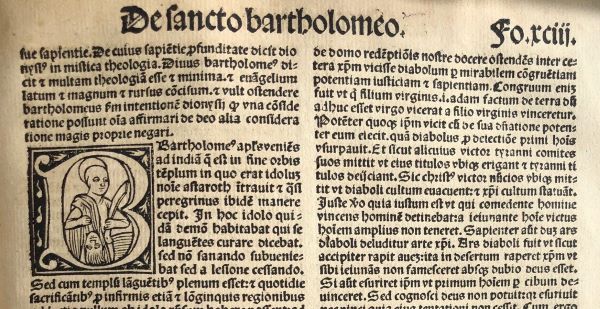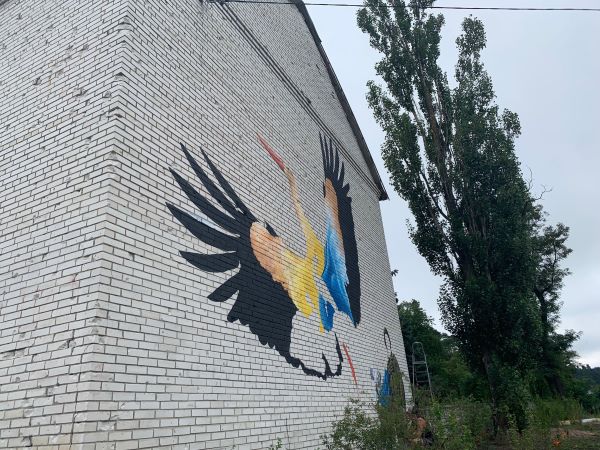Today, 24 August marks six months since the full-scale invasion of Ukraine, and the lives of millions of people were upturned.
I recently visited a small village called Moschun, which was badly damaged early on in the war. They are painting a mural of a mother stork onto the side of the community building in Moschun. It is a sign of hope. People pray for a mother stork to nest in the roofs of their homes because they say it brings luck, and they pray this mural might do the same.
Many of the communities around Kyiv were occupied, but Moschun was a site of battle. Eighty percent of the village was destroyed. Ukrainian and Russian tanks fought fiercely, and artillery damage is severe. Civilians caught in the middle hid underground in cellars and basements. An elderly couple who refused to leave their home were killed.
Moschun is a half-hour drive from the centre of Kyiv. We drove beyond what was the defensive line during the siege of the capital. The road bears the indents of tanks which drove along it, and if you look closely, you see Ukrainian soldiers remain in trenches in the forest which encloses us. A local man accused by Russian troops of assisting Ukrainian forces through the forest was shot dead. At the checkpoint as you enter the town, to the right you see a doll dressed in a Russian uniform, hanged with a noose from a tree.
Depaul Ukraine was the first agency to reach Moschun with assistance after its liberation in April. People were desperate for essential items, such as food. Working with the local social worker, Depaul staff and volunteers visited people’s homes with vital supplies. People told me that it is not just the assistance they appreciate. Depaul’s team are with them: they stop and talk and listen and cry with people whose lives are shattered. This is not just an exchange of materials, but an exchange of humanity.
In Moschun, the destruction is overwhelming. Two hundred people remain here – about a quarter of the original population – and fifty of those are children. I met a woman whose house was destroyed, all that’s left of her home is a bathtub. She now lives in a shed, which will not be safe for winter.
Across the road, her neighbour had taken out a loan for materials to build his own home. His ten-year building project is in ruins. He is still paying off his debts. His sister lives on the other side of the neighbourhood, a hundred metres down an off-road track. She was heavily pregnant when the war began. She lived in a cellar with her husband for days. The cellar door is now all that is left of her home. The family, including their new-born baby, currently live in an agricultural outbuilding.
The needs are changing from when Depaul first began to work in this community. Winter is on everyone’s minds, even as we stand in 30C heat. The new mum is already preserving food grown around her plot of land for winter. Another lady pulled me into where she now lives, which is nothing more than a shed with a bed and a battery lamp which barely emits light. We both know that she will not survive the Ukrainian winter in this – temperatures can plummet to -20C. People urgently need new accommodation, or materials to repair their homes. She begins to cry. She is alone here.
Depaul Ukraine has been helping homeless people to survive the winter months for over fifteen years. Without access to housing or healthcare, homeless people are at risk of hypothermia and frostbite, and sadly many die every year. Through outreach programmes, emergency and temporary accommodation services, and facilitating hospital admissions, Depaul has saved thousands of lives.
But this year will be different. Millions are homeless as a result of the war. Many of the people I met in Moschun are living in sheds and outhouses, which are not sufficiently insulated for winter.
Depaul Ukraine is working round-the-clock to help people with basic repairs to safeguard their homes from the cold, providing survival kits, including clothing, light, blankets, food and fuel, and also providing temporary accommodation for the most vulnerable.
My visit to Moschun has given me an insight into how six months of war has affected a community. So many of the town’s buildings were destroyed or damaged during the first six months of the war, leaving people without safe shelter for the coming winter months. It will take years of reconstruction to rebuild Moschun, but in the meantime, people need support to survive the winter months.
Ewan Day-Collins is the Emergency Programme Manager for Depaul International.
You can donate to Depaul's work in Ukraine here: https://int.depaulcharity.org/fundraising-for-depaul-ukraine/



 Loading ...
Loading ...
What do you think?
You can post as a subscriber user ...
User comments (0)